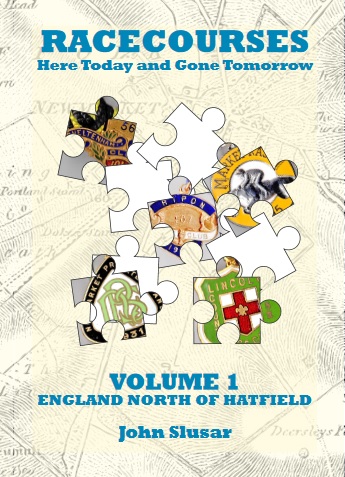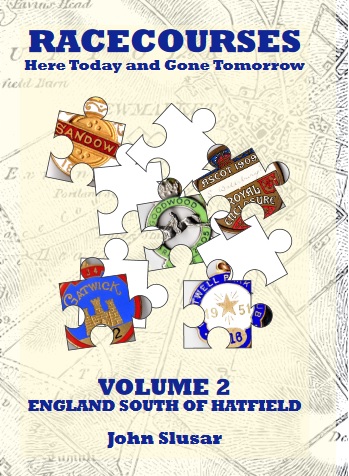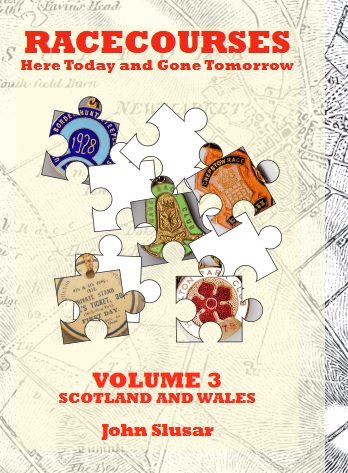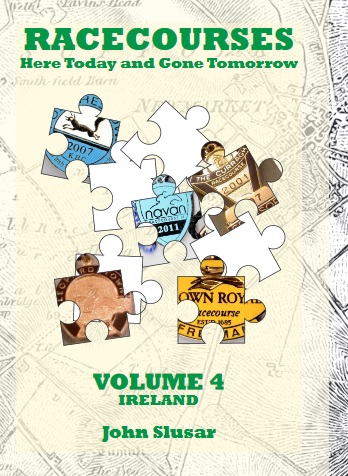Pre 1759 Mr Thuytes
Some sources suggest that well before Isaac Cape trained at Tupgill a Mr Thuytes was training there at the time when the famous racehorse Bay Bolton, bred by Sir Matthew Pierson and later owned by the Duke of Bolton, whose estate was Bolton Hall, was beating all before him. Indeed, on the High Moor, where Thuytes trained, Bay Bolton was buried with his shoes still on him. It was common practice in those early days for horses to have their tails docked and their ears cropped, but Thuytes was against this practice stating, 'They came into the world with 'em and were not foaled with besom stumps'. Bay Bolton, by Grey Hautboy out of a Makeless mare, famously won the 1710 Queen Anne Gold Cup at York and the Subscription Purse on Middleham Moor racecourse. After these victories he was sent to Newmarket where he won matches against the Duke of Somerset's Wyndham, Sir Matthew Person's Merlin and Mr Frampton's Dragon. At stud he was one of the most successful of his generation, being crowned leading sire of Great Britain and Ireland in 1724, 1726, 1727, 1729, 1732-34.
1760-1798 Isaac Cape
Isaac Cape, born at Middleton Tyas, near Scotch Corner, Richmond, North Yorkshire in 1720, made a name for himself when riding as a very young boy for John Hutton of Markse, Richmond. The earliest occasion he is recorded in Middleham is 1733 when he was riding aged just 13, but he also rode regularly for Mr Mann of Boroughbridge. He then began training at Tupgill in 1760, making him one of the first recognised trainers in Middleham. He was such an accomplished trainer that he was able to buy Tupgill Stables, training for the likes of Sir Charles Turner, Sir Rowland Winn, Sir John Lister Kaye, and is best known for training the 1777 and 1783 St Leger winners Bourbon (SR 1890) and Phenomenon (SR 1907) owned by William Sotherton and Sir John Lister Kaye respectively. He regularly made use of the jockeys George Searle, Thomas Thompson, John Mangle and Charles Dawson, but it was John Cade and Anthony Hall who rode his Classic winners.
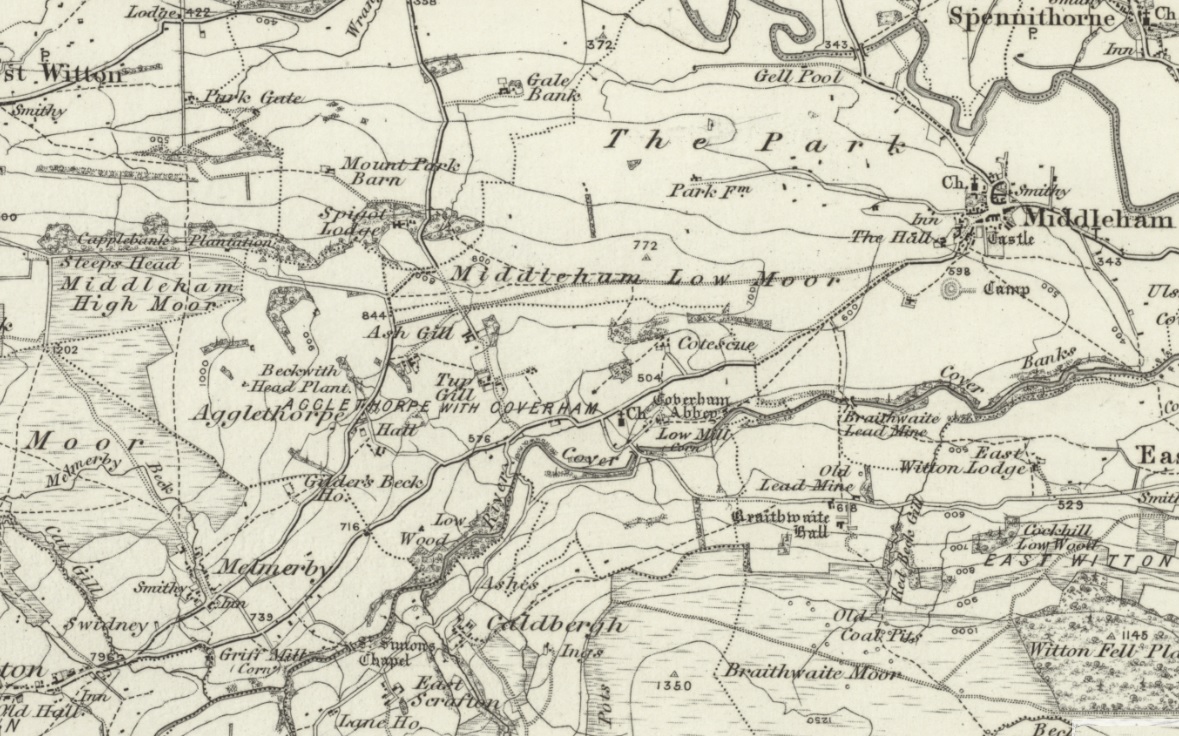
However, one of his biggest mistakes was to let one of his promising apprentices, John Mangle(s) slip through his hands when the pair had a row and Cape moved Mangle on to neighbour John Hoyle at Ashgill. John Mangle inherited Ashgill and trained and rode 4 St Leger winners, including 3 in successive years. Isaac Cape died at Tupgill on 30th November 1798, aged 78, and was buried in the nearby Coverham churchyard.
1777 St Leger at Doncaster BOURBON (SR 1890) 3/1 owned by William Sotherton, trained by Isaac Cape and ridden by John Cade
1783 St Leger at Doncaster PHENOMENON (SR 1907) 5/4 fav owned by Sir John Lister Kaye, trained by Isaac Cape and ridden by Anthony Hall
John Lonsdale trained at Tupgill at the very end of the 18th century and the first decades of the 19th century. In 1803 he won his first Classic, the Epsom Derby, with Ditto (SR 1953) owned by Sir Hedworth Williamson, the colt later claiming the 1804 Claret Stakes and 1805 Craven stakes, both at Newmarket. Five years later Lonsdale won the Epsom Derby for the second, and final, time with Pan (SR 2002), again for owner Sir Hedworth Williamson. Despite the two Derby wins, his best horse was the legendary Doctor Syntax, by Paynator out of a Beningbrough mare who was bred in 1811 by Humphrey Osbaldeston at Hunmanby, East Yorkshire. He was sold to William Knapton, and was so small as a two-year-old that his owner thought he would only be fit to be a hack. He contemplated having the horse cut, but in the end relented and the colt was sold to Ralph Riddell, and it was he who named the horse Doctor Syntax. The horse was sent to John Lonsdale to be trained at Tupgill, ending up as his stable star, contesting 49 races, of which he won 36, including 7 consecutive Preston Gold Cups, 5 Lancaster Gold Cups and Richmond Gold Cups, in addition to the 1815 Middleham Gold Cup run on his doorstep. He retired in 1823 aged 12 and began his stallion career in 1824, although he was not in great demand due to his size and looks. Nevertheless, he sired two Classic winners, the 1837 1000 Guineas winner Chapeau d'Espagne (SR 1937) and the 1841 2000 Guineas winner Ralph (SR 1952). However, by far the best horse he sired was Beeswing who was also trained at Tupgill by Robert Johnson, so often the rider of Doctor Syntax. Irrespective of his undoubted successes with Doctor Syntax, Lonsdale trained 4 consecutive St Leger winners, 3 of which were ridden by stable jockey, and son-in-law Bob Johnson. The sequence began in 1817 with Ebor (SR 1941), followed by the best of the 4 winners Reveller (SR 2064); this was followed in 1819 by Antonio (SR 1789) and rounded off in 1820 with St Patrick (SR 2019). Reveller was a superb horse, also winning the 1819 Doncaster Stakes, back-to-back wins in the 1821 and 1822 Lancaster Cup, and victory in the Preston Gold Cup in 1821 and 1823.John Lonsdale died at Tupgill on Monday 17th October 1825 and Tupgill was taken over by his son Watson..
1803 Epsom Derby DITTO (SR 1953) 7/2 owned by Sir Hedworth Williamson, trained by John Lonsdale and ridden by William Clift
1804 Claret Stakes at Newmarket DITTO 4/7 fav owned by Sir Hedworth Williamson, trained by John Lonsdale and ridden by William Clift
1805 Craven Stakes at Newmarket DITTO 3/1 owned by Sir Hedworth Williamson, trained by John Lonsdale and ridden by William Clift
1808 Epsom Derby PAN (SR 2002) 25/1 owned by Sir Hedworth Williamson, trained by John Lonsdale and ridden by Frank Collinson

1815 Craven Stakes at Catterick Bridge DOCTOR SYNTAX owned by Ralph Riddell, trained by John Lonsdale and ridden by Robert Johnson
1815 Middleham Gold Cup DOCTOR SYNTAX owned by Ralph Riddell, trained by John Lonsdale and ridden by Robert Johnson
1815 Lancaster Gold Cup DOCTOR SYNTAX evens fav owned by Ralph Riddell, trained by John Lonsdale and ridden by Robert Johnson
1815 Preston Gold Cup DOCTOR SYNTAX 4/6 fav owned by Ralph Riddell, trained by John Lonsdale and ridden by Robert Johnson
1816 Craven Stakes at Catterick Bridge DOCTOR SYNTAX owned by Ralph Riddell, trained by John Lonsdale and ridden by Robert Johnson
1816 Lancaster Gold Cup DOCTOR SYNTAX owned by Ralph Riddell, trained by John Lonsdale and ridden by Robert Johnson
1816 Preston Gold Cup DOCTOR SYNTAX 2/1 owned by Ralph Riddell, trained by John Lonsdale and ridden by Robert Johnson
1817 Preston Gold Cup DOCTOR SYNTAX 2/1 owned by Ralph Riddell, trained by John Lonsdale and ridden by Robert Johnson
1818 St Leger at Doncaster REVELLER (SR 2064) 7/2 owned by Henry Peirse, trained by John Lonsdale and ridden by Bob Johnson
1818 Preston Gold Cup DOCTOR SYNTAX evens jt fav owned by Ralph Riddell, trained by John Lonsdale and ridden by Robert Johnson
1818 Lancaster Gold Cup DOCTOR SYNTAX owned by Ralph Riddell, trained by John Lonsdale and ridden by Robert Johnson
1818 Richmond Gold Cup DOCTOR SYNTAX owned by Ralph Riddell, trained by John Lonsdale and ridden by Robert Johnson
1819 Preston Gold Cup DOCTOR SYNTAX owned by Ralph Riddell, trained by John Lonsdale and ridden by Robert Johnson
1819 Lancaster Gold Cup DOCTOR SYNTAX 1/10 fav owned by Ralph Riddell, trained by John Lonsdale and ridden by Robert Johnson
1819 Produce Stakes at Doncaster REVELLER 1/3 fav owned by Henry Peirse, trained by John Lonsdale and ridden by Bob Johnson
1819 Dundas Stakes at Richmond DOCTOR SYNTAX owned by Ralph Riddell, trained by John Lonsdale and ridden by Robert Johnson
1819 Doncaster Stakes at Doncaster REVELLER 1/4 fav owned by Henry Peirse, trained by John Lonsdale and ridden by Tom Nicholson
1819 St Leger at Doncaster ANTONIO (SR 1789) 100/3 owned by James Ferguson, trained by John Lonsdale and ridden by Tom Nicholson
1820 Preston Gold Cup DOCTOR SYNTAX 2/5 fav owned by Ralph Riddell, trained by John Lonsdale and ridden by Robert Johnson
1820 Lancaster Gold Cup DOCTOR SYNTAX 1/2 fav owned by Ralph Riddell, trained by John Lonsdale and ridden by Robert Johnson
1820 Richmond Gold Cup DOCTOR SYNTAX 5/6 fav owned by Ralph Riddell, trained by John Lonsdale and ridden by Robert Johnson
1820 Dundas Stakes at Richmond DOCTOR SYNTAX owned by Ralph Riddell, trained by John Lonsdale and ridden by Robert Johnson
1820 St Leger at Doncaster ST PATRICK (SR 2019) 7/1 owned by Sir Edward Smith, trained by John Lonsdale and ridden by Bob Johnson
1821 Preston Gold Cup DOCTOR SYNTAX 2/1 fav owned by Ralph Riddell, trained by John Lonsdale and ridden by Robert Johnson
1821 Richmond Gold Cup DOCTOR SYNTAX 2/5 fav owned by Ralph Riddell, trained by John Lonsdale and ridden by Robert Johnson
1821 Dundas Stakes at Richmond DOCTOR SYNTAX 8/13 fav owned by Ralph Riddell, trained by John Lonsdale and ridden by Robert Johnson
1821 Lancaster Gold Cup REVELLER evens owned by Henry Peirse, trained by John Lonsdale and ridden by Bob Johnson
1822 Richmond Gold Cup DOCTOR SYNTAX 1/10 fav owned by Ralph Riddell, trained by John Lonsdale and ridden by Robert Johnson
1822 Lancaster Gold Cup REVELLER 4/6 fav owned by Henry Peirse, trained by John Lonsdale and ridden by Bob Johnson
1819 Preston Gold Cup REVELLER evens fav owned by Henry Peirse, trained by John Lonsdale and ridden by Bob Johnson
1822 Northallerton Gold Cup DOCTOR SYNTAX 1/10 fav owned by Ralph Riddell, trained by John Lonsdale and ridden by Robert Johnson
1823 Richmond Gold Cup DOCTOR SYNTAX 1/10 fav owned by Ralph Riddell, trained by John Lonsdale and ridden by Robert Johnson
1823 Preston Gold Cup REVELLER walked-over
1823 Gosforth Stakes at Newcastle DOCTOR SYNTAX 2/7 fav owned by Ralph Riddell, trained by John Lonsdale and ridden by Robert Johnson
1823 Pontefract Gold Cup DOCTOR SYNTAX 1/15 fav owned by Ralph Riddell, trained by John Lonsdale and ridden by Robert Johnson

1825-1843 Watson Lonsdale
Watson Lonsdale, born in 1792, was the son of Middleham trainer John Lonsdale and brother-in-law of jockey and trainer Bob Johnson. When John Lonsdale died on 17th October 1825 Watson Lonsdale took charge at Tupgill, at a time when Bob Johnson was still riding for the stable. Watson then trained with jointly with Bob Johnson at Tupgill after Johnson retired from race riding, when the stable had such stars as Beeswing, Tomboy and Nutwith. When Bob Johnson retired in 1843 Tupgill was taken over by George Dawson at a time when Watson Lonsdale was appointed trainer to Lord Glasgow, who owned Glasgow House. He was probably at Glasgow House from 1844 to 1846, although it may well have been longer, but unfortunately, such was the irascible character of Lord Glasgow that he was unlikely to have lasted more than 2 to 3 years. He then moved to Belleisle, Richmond to continue his training career, and died there on 13th October 1868.
1831-1843 Bob Johnson
Robert Johnson, always known as Bob, was born in Sunderland in 1788 and spent much of his riding career based in Middleham where he was famously associated with Dr Syntax trained by John Lonsdale. In addition to his countless victories on Dr Syntax, Johnson also won the St Leger on 4 occasions, firstly in 1812 on Otterington, then consecutive wins in 1817 and 1818 on Ebor and Reveller with a final victory in the 1820 St Leger aboard St Patrick. Bob married John Lonsdale's daughter, and when Lonsdale died in 1825 Tupgill remained vacant for a period, but Bob Johnson took charge at Tupgill in 1831, although he continued to ride until after the 1836 Doncaster Gold Cup. He was immediately rewarded in 1831 with the horses of Ralph Riddell, owner of Dr Syntax, who transferred his horses from George Oates at Ashgill, although the reward was short-lived because Riddell died in March 1833. As a trainer Johnson will best be remembered for his association with the great mare Beeswing, possibly the greatest mare of all time. At a time when Bob Johnson was with Watson Lonsdale there was an apprentice named James Watson who was with Watson Lonsdale at Tupgill in the late 1820s. James Watson, born on 3rd July 1813, later took charge of the Nunnykirk Stud in the late 1830s, becoming the private trainer to William Orde junior. Watson was associated with Beeswing in her early years, although he then opted to become a public trainer, allowing Beeswing to be transferred to Bob Johnson at Tupgill for her final racing years. It was during the latter stages of her career that she gained her best win in the 1842 Ascot Gold Cup. Her wins during her time with Johnson included the1841 Chester Trial Stakes, Chester Stand Cup, Newcastle Gold Cup, Stockton Gold Cup, Doncaster Stakes, Richmond Gold Cup and Richmond Her Majesty's Plate. Arguably, her best year was in 1842, her final year, winning the Ascot Gold Cup, Chester Queen's 100 Guineas, Newcastle Gold Cup and Doncaster Cup.
1812 St Leger at Doncaster OTTERINGTON (SR 1805) 100/1 owned by Ralph Rob, trained by W Hesseltine and ridden by Bob Johnson
1817 St Leger at Doncaster EBOR (SR 1941) 25/1 owned by Henry Peirse, trained by John Lonsdale and ridden by Bob Johnson
1818 St Leger at Doncaster REVELLER (SR 2064) owned by Henry Peirse, trained by John Lonsdale and ridden by Bob Johnson
1820 St Leger at Doncaster ST PATRICK (SR 2019) 7/1 owned by Sir Edward Smith, trained by John Lonsdale and ridden by Bob Johnson
1842 Ascot Gold Cup BEESWING 7/1 owned by William Orde jnr, trained by Bob Johnson and ridden by Cartwright
1843 St Leger at Doncaster NUTWITH (SR 1958) 100/7 owned by Samuel Wrather, trained by Bob Johnson and ridden by Job Marson
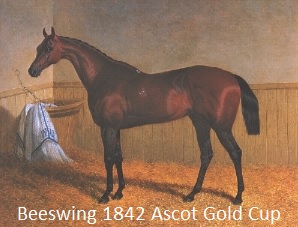

Students of racing history will be familiar with the exploits of the four Dawson brothers-Tom, Mat, Joseph and John, who trained the winners of 44 Classics between them. But perhaps lesser known is that two more brothers, George and James also trained. George was the oldest son of his trainer father George senior's first marriage, and was therefore an older half-brother to the other five. On leaving their Scottish roots Tom, with George as his assistant, began training at Brecongill in 1830. Their first Classic winner, 1842 Epsom Oaks winner Our Nell (SR 1844), was owned by George, named after sister Ellen, and ridden by brother-in-law Tommy Lye. George's death notice appeared in the Yorkshire Post 29th April 1867: 'We regret that Mr George Dawson expired at Middleham on Thursday last. He had suffered for some time past from cancer in the stomach. Deceased was half-brother of Messrs Thomas, Mathew, Joseph and John Dawson the well-known trainers, he being a son of their father's first wife. He acted as starter at several of the north country meetings.
The four younger boys also served time with Tom, James remaining in Yorkshire for his career. Mat, Joseph and John's outstanding careers are well chronicled from their West Berkshite locations, including at Lambourn, Russley, Ilsley & Compton through to their long standing successful tenures at Newmarket.
The next generation of Dawsons to train included Tom's sons George L (1837-1895) and Thomas S (1840-1886). Tom's only son-in-law was his future successor Fred Bates. John's sons included George P T (1856-1913), himself a trainer of 10 Classic winners, and John A (1859-1942). John was also father-in-law to the great Fred Archer.
1844-1849 George Dawson, Mathew Dawson
George Dawson, son of George Dawson senior from his first marriage, was born in Gullane in 1797 and was the half-brother to the more famous Mathew, Tom, John, Joseph and James. He joined his half-brother Tom in Middleham when Tom was training at Brecongill between 1830 and 1843, but when Bob Johnson retired from training at Tupgill in 1843 the Tupgill stables were taken over by Messrs Dawson in 1844. This meant that Tom remained in charge at Brecongill while George ran the Tupgill operation. During his time in sole charge at Tupgill, George trained Franchise to win the 1844 Goodwood Stakes, while Rowena contested some of the top races in 1844 and 1845. In 1848 Mathew Dawson, who had been head lad for Tom at Middleham, returned to Scotland in 1842 to train in his own right at Bogside with just 7 horses. At Gullane in 1845 and 1846 he had a string of 14 horses, but he departed Scotland at the start of the 1848 season to join George at Tupgill, bringing with him a string of 8 horses. He remained in Middleham for just one season before being appointed as racing manager of Lord John Scott's stud at Cawston Lodge near Rugby, Warwickshire. In 1849 Tom Dawson left Brecongill for Tupgill where he took charge, ably supported by George. In his later life George was a starter at many of the Northern meetings, including Kelso, Ripon, Thirsk, Beverley and Catterick. He died of stomach cancer in Middleham on Thursday 18th April 1867 and was buried in Middleham churchyard on Sunday 21st April 1867.
1844 Goodwood Stakes FRANCHISE 7/1 owned by Mr Wreford, trained by George Dawson and ridden by A Day
1851-1852 J Elliott
In 1851 J Elliott was training from some stables at Tupgill, leasing them from Tom Dawson, and training just 2 horses privately for Prince Galetzon. The two were good horses, Bird-on-the-Wing being entered for the Northumberland Plate, and Young Altisidora for the Free Handicap.
Thomas Dawson, eldest son of the Dawson Family of Gullane from his second marriage, was born in 1809 and left Gullane in 1830 to move south, settling at Brecongill stables, Middleham, in Yorkshire, where he trained for Lord Eglinton. On 13th December 1836 Thomas married Grant Watt Sutherland, who he met in Edinburgh, at Dirleton Church in East Lothian and the couple were blessed with 3 children. His more famous brother, Mathew, joined him at Brecongill in 1838 where he became Head Lad, and was also joined at a later stage by his half brother George and other brothers John and Joseph who both served their apprenticeships with him. Whilst almost every other member of his famous family drifted towards Newmarket, Tom remained in Middleham, initially at Brecongill, and after 1849 at Tupgill. Tom was a pioneer trainer because the norm in those days was to sweat horses by wrapping them in heavy rugs in order to get rid of excess fat and surplus flesh, but he preferred to exercise them, and it clearly worked because he won 7 English Classics. The year 1842 was a pivotal year for Tom, winning both the Epsom Oaks with Our Nell (SR 1844), owned by his brother George, and the St Leger with Blue Bonnet (SR 1861) owned by Lord Eglinton, his most influential backer. In 1849 he moved across the Tupgill Estate to train at Tupgill stables where he enjoyed even more success, including 5 more Classic victories. In 1856 he won the Epsom Derby for the first time with Ellington (SR 1968) owned by Admiral Octavius Harcourt, and named after a village near Masham, North Yorkshire where the Admiral lived. Tom won a great deal of ready money on Ellington at Epsom, but it could all have gone so wrong. He put the thick wad of money inside his hat, which he put inside his hatbox and tied it tight with string. When he departed the London train at Northallerton Station he left the hat box on the train. Unflustered, he sent a postcard to the railway company informing them that he had forgotten his hat box on the Newcastle train. A fortnight later the hat box, still tied with string, arrived at Tupgill and to Tom's amazement, when he opened the box there was both the hat and his winnings inside. He had to wait 8 years before landing his next Classic, the 1864 2000 Guineas with General Peel (SR 1948) owned by the 5th Earl of Glasgow. Tom was most famous for sending out Pretender (SR 2018) to win the 2000 Guineas and Epsom Derby, reportedly taking 3 months to get to Epsom, although in truth he is likely to have been stabled in the south after his 2000 Guineas win at Newmarket. It was to be a further 76 years before the next Northern trained Derby winner, Dante, trained in Middleham at Manor House stables. Pretender was buried at Brecongill, with a stone marking the spot, and is said to have been buried vertically. Tragedy struck Tupgill on 20th June 1868 when a stable lad, James Fieldhouse, and another boy, were struck by lightning while exercising horses, and one of the horses, 1866 Northumberland Plate winner Rococo was also killed. In 1868, while Tom Dawson continued to train at Tupgill, his son George trained at Hambleton House, Hambleton, and other son Tom S Dawson was based at East Ilsley. At the age of 62 Tom trained his final Classic winner in 1871 when Bothwell (SR 1964) won the 2000 Guineas for loyal owner John Johnstone. Even as late in his career as 1870, he still commanded a string of 40 horses, while his son George, also training by then, trained 17 horses at Tupgill. Tom was joined at Tupgill by his son-in-law Fred Bates who had previously trained at Stork House, Lambourn, and on Tom Dawson's retirement Fred took charge. Tom Dawson retired from the training ranks at the end of the 1872 season, moving to nearby Thorngill where he enjoyed 8 years retirement. However, in 1879 he required an operation which went well, but despite being 70 years old and told to rest, Tom insisted on witnessing a trial on Middleham High Moor and caught a chill. He gradually got worse and died at Thorngill on 18th February 1880.
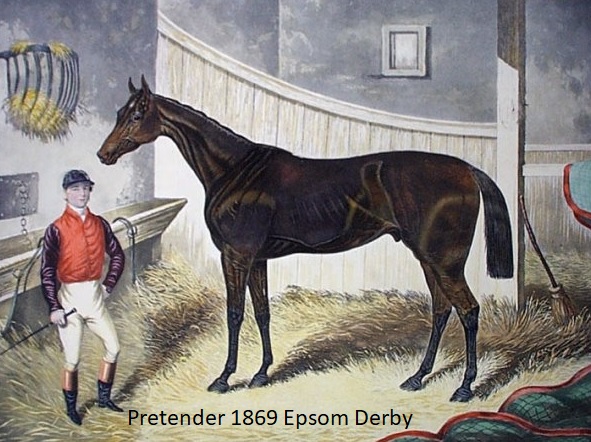
1856 Epsom Derby ELLINGTON (SR 1968) 20/1 owned by Admiral Octavius Harcourt, trained by Tom Dawson and ridden by Tom Aldcroft
1860 St James's Palace Stakes at Royal Ascot TOM BOWLINE 6/5 fav owned by Lord Glasgow, trained by Tom Dawson and ridden by Tom Aldcroft
1864 2000 Guineas at Newmarket GENERAL PEEL (SR 1948) 7/2 owned by 5th Earl of Glasgow, trained by Tom Dawson and ridden by Tom Aldcroft
1866 Queen Alexandra Stakes at Royal Ascot STRAFFORD 100/15 owned by Lord Glasgow, trained by Tom Dawson and ridden by John Osborne jnr
1866 Northumberland Plate at Newcastle ROCOCO 7/2 owned by John Johnstone, trained by Tom Dawson and ridden by Cameron
1869 2000 Guineas at Newmarket PRETENDER (SR 2018) 100/30 owned by John Johnstone, trained by Tom Dawson and ridden by John Osborne jnr
1869 Epsom Derby PRETENDER (SR 2018) 11/8 fav owned by John Johnstone, trained by Tom Dawson and ridden by John Osborne jnr
1869 Queens Vase at Royal Ascot THORWALDSEN 5/1 owned by John Johnstone, trained by Tom Dawson and ridden by John Osborne jnr
1870 Ascot Stakes at Royal Ascot MUSKET 2/1 fav owned by G Payne, trained by Tom Dawson and ridden by Tom Chaloner
1871 2000 Guineas at Newmarket BOTHWELL (SR 1964) 11/2 owned by John Johnstone, trained by Tom Dawson and ridden by John Osborne jnr
1871 Queens Vase at Royal Ascot CHRISTOPHER SLY 8/1 owned by John Johnstone, trained by Tom Dawson and ridden by W Gary
1860-November 1862, 1871-November 1873 George Dawson jnr
George Lodowick Dawson, son of Tom Dawson, was always known as George Dawson jnr and trained at Tupgill in the early 1860s and again in the early 1870s. In the 1860s he lived at Tupgill Lodge, but he was not a successful trainer, and in November 1862 he was declared bankrupt. He did make a brief comeback in the early 1870s, but once again found himself at Northallerton Bankruptcy Court, where he filed a petition declaring that he was unable to pay his debts.
Thomas Sutherland Dawson, oldest son of Tom Dawson, was born at Thorngill Lodge on 23rd April 1840 and registered his colours in 1861. He successfully applied for his own trainer's licence in 1862 and began training at Tupgill alongside his father but on his own account. He was highly successful during his 5 years at Tupgill, training for Lord Glasgow amongst others. He won the 1862 Chester Cup with Tim Whiffler 25/1, in addition to the Queen's Vase, Goodwood Cup and Doncaster Cup. His string numbered 35 in 1862, which was his most successful year, and increased to 39 in 1863. He won the 1862 Ayr Gold Cup with Little Captain, and such was his reputation, that his numbers increased to 43 in 1865 and 60 in the year he left Tupgill, 1866. He married in 1866 and moved, with his wife, to Spring Cottage Norton in 1867, and at the end of the season transferred to Ilsley, training 22 horses in his first year there, and 14 in 1868. When his father Tom senior retired to his Thorngill Lodge in 1872, Thomas Sutherland Dawson began training at Thorngill there in 1873 where he remained until his father's death in 1880. Thomas then moved to Hungerford House, Malton and spent time as Clerk of a number of Yorkshire racecourses. He died aged just 46 at Hungerford House on Saturday 30th October 1886 and was buried in Norton Cemetery.
1862 Chester Cup TIM WHIFFLER 25/1 owned by J Jackson, trained by Thomas Sutherland Dawson and ridden by Doyle
1862 Queens Vase at Royal Ascot TIM WHIFFLER 5/1 owned by J Jackson, trained by Thomas Sutherland Dawson and ridden by Ralph Bullock
1862 Goodwood Cup at Glorious Goodwood TIM WHIFFLER 7/2 owned by Lord W Powlett, trained by Thomas Sutherland Dawson and ridden by Ralph Bullock
1862 Ayr Gold Cup LITTLE CAPTAIN owned by Mr Oswald, trained by Tom Dawson jnr and ridden by Blackburn
1862 Doncaster Cup TIM WHIFFLER 4/6 fav owned by Lord W Powlett, trained by Thomas Sutherland Dawson and ridden by Ralph Bullock
Frederick Bates, born in Nottingham in August 1840, was born into a horse loving family, his father kept a livery stable, so it was no surprise that he joined a racing stable after completing his education. He became apprentice to Tom Dawson at Tupgill stables, Middleham and married Tom's daughter, the marriage being blessed with a son, Harry Dawson Bates who followed his father into the training ranks. His first victory of note was on 20th October 1853 when partnering The Jealous One to victory at Richmond, and his low riding weight meant that he was in demand in all of the handicaps. He won the 1855 Cesarewitch on Mr Sykes (15/2), beating Crown Pigeon and Poodle and, in the same year, was aboard The Wild Huntsman when winning the Great Yorkshire Handicap at Doncaster. Another notable success was chalked up 2 years later when Gathercole won the 1857 Ayr Gold Cup, but by 1862 he had hung up his riding boots and turned his hand to training. He launched his career at stables in Thirsk in 1862, moving on to Cheltenham and thence on to Stork House in Lambourn around 1866. Between 1868 and 1872 his string was sufficiently large for him to make use of Lambourn House as a second yard. However, he did make a return to partner Vulcan (30/100 fav) to success in the 1869 Claret Cup at the Kingsbury July Meeting, the horse just getting up on the line to beat Minster and Dr Wilson, having stumbled and been brought to a standstill. John Drislane, who had trained for Joseph Saxon at Saxon House for about 3 years, left that establishment to join Fred Bates, and when Bates moved to Middleham, Drislane went with him, eventually training there in his own right until his untimely death by a freak accident on the gallops on Saturday 7th February 1891. Bates remained at Stork House until the Spring of 1872, transferring to Grafton House, Newmarket with 14 horses, where he remained unil January 1873, returning thereafter to the same Tupgill Stables where he had been an apprentice, replacing his old boss Thomas Dawson, supported by a number of prominent owners, notably Sir Robert Jardine. He enjoyed tremendous success in Middleham, especially with Border Minstrel who won the Doncaster Stakes, Great Northern Leger, Caledonian Cup, Ascot Gold Vase, Great Northern Handicap and Goodwood Cup in 1883. In 1876 he won the Chester Cup with Tam O'Shanter, and a year later he carried off the 1877 Cesarewitch with Hilarious. Royal Ascot was a particularly important meeting for Fred who won the 1884 Royal Hunt Cup with Acrostic, but there is little doubt that his favourite race was the Ascot Stakes which he won on seven occasions, all listed below. Fred suffered a fit on Saturday 9th June 1906 while at Cotescue Park and died two days later aged 66, later being buried in Coverham Churchyard.
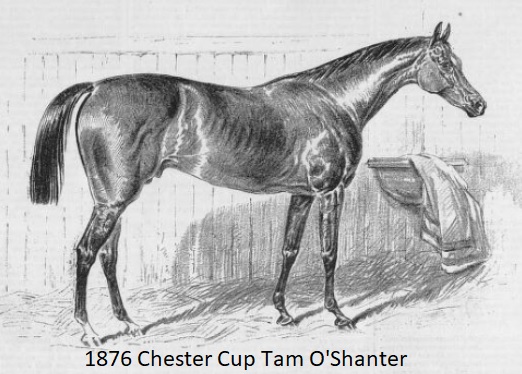
1876 Chester Cup TAM O'SHANTER 9/1 owned by Mr Johnstone, trained by Fred Bates and ridden by Thompson
1877 Cesarewitch at Newmarket HILARIOUS 100/30 owned by Robert Jardine, trained by Fred Bates and ridden by J Macdonald
1878 Liverpool Summer Cup STRATHMORE 8/1 owned by Robert Jardine, trained by Fred Bates and ridden by J Macdonald
1880 Ascot Stakes at Royal Ascot TEVIOTDALE (4/6 fav) owned by Robert Jardine, trained by Fred Bates and ridden by Kellett
1880 Gimcrack Stakes at York SIMNEL 11/10 fav owned by Robert Jardine, trained by Fred Bates and ridden by John Osborne
1881 Ascot Stakes at Royal Ascot TEVIOTDALE (5/1) owned by Robert Jardine, trained by Fred Bates and ridden by John Osborne
1881 Wokingham Stakes at Royal Ascot ST ALBANS COLT 6/1 owned by Robert Jardine, trained by Fred Bates and ridden by G Barrett
1881 King's Stand Stakes at Royal Ascot ISHMAEL 6/1 owned by Robert Jardine, trained by Fred Bates and ridden by John Osborne
1881 Ayr Gold Cup HEATH BIRD 4/1 owned by Robert Jardine, trained by Fred Bates and ridden by Bowman
1883 Ascot Stakes at Royal Ascot ISHMAEL (9/2) owned by Robert Jardine, trained by Fred Bates and ridden by George Fordham
1883 Doncaster Stakes BORDER MINSTREL (15/100 fav) owned by John Johnstone, trained by Fred Bates and ridden by John Osborne
1883 Ascot Gold Vase at Royal Ascot BORDER MINSTREL (11/8 fav) owned by John Johnstone, trained by Fred Bates and ridden by C Bowman
1883 Great Northern Leger BORDER MINSTREL (9/100 fav) owned by John Johnstone, trained by Fred Bates and ridden by John Osborne
1883 Caledonian Cup BORDER MINSTREL (1/10 fav) owned by John Johnstone, trained by Fred Bates and ridden by C Bowman
1883 Great Northern Handicap at York BORDER MINSTREL (2/1 fav) owned by John Johnstone, trained by Fred Bates and ridden by C Bowman

1884 Royal Hunt Cup at Royal Ascot ACROSTIC (100/7) owned by Robert Jardine, trained by Fred Bates and ridden by Fred Barrett
1884 Ascot Stakes at Royal Ascot GREENBANK (6/1) owned by Robert Jardine, trained by Fred Bates and ridden by C Bowman
1889 Lincoln Handicap at Lincoln WISEMAN 8/1 owned by Sir Robert Jardine, trained by Fred Bates and ridden by Tommy Loates
1889 Ascot Stakes at Royal Ascot LORD LORNE (8/1) owned by Sir Robert Jardine, trained by Fred Bates and ridden by Chandley
1890 Ascot Stakes at Royal Ascot LORD LORNE (5/2 fav) owned by Sir Robert Jardine, trained by Fred Bates and ridden by Fagan
1892 Ascot Derby (later King Edward VII Stakes) LLANTHONY 6/5 jt fav owned by Sir Robert Jardine, trained by Fred Bates and ridden by G Barrett
1893 Ascot Stakes at Royal Ascot ENNISKILLEN (6/1) owned by Sir Robert Jardine, trained by Fred Bates and ridden by Tommy Loates
1893 Prince of Wales's Stakes at Royal Ascot RED ENSIGN 7/2 owned by Sir Robert Jardine, trained by Fred Bates and ridden by Tommy Loates
1895 Great Ebor Stakes at York LLANTHONY 6/1 owned by Sir Robert Jardine, trained by Fred Bates and ridden by Fred Finlay
1895 Great Yorkshire Stakes at York BRIARDALE 13/8 owned by Sir Robert Jardine, trained by Fred Bates and ridden by Fred Finlay
1900-1901 Thomas H Dale
For a short period at the turn of the Century Thomas H Dale occupied Ashgill stables (1899-1900) then Tupgill as a public trainer. He trained some horses for Matthew Dobson Peacock, owner of the Manor House in Middleham, winning the 1900 Gosforth Park Juvenile Stakes at Newcastle for Peacock with Queen's Manor. In May 1901 Thomas Dale and W Elsey, then training at Baumber Park, jointly negotiated a deal to train 50 horses at Hedon as soon as 20 new boxes were ready. By then Dale had purchased a house in Hedon from J Emmerson in readiness of the move, although he was still training in Middleham in October when sending out Golden Rule to win the Scarborough Handicap at Beverley.
April 1900 Gosforth Park Juvenile Stakes at Newcastle QUEEN'S MANOR 10/1 owned by Matthew Dobson Peacock, trained by Thomas H Dale and ridden by Heppell
October 1901 Scarborough Handicap at Beverley GOLDEN RULE 4/1 trained by Thomas H Dale and ridden by J McCall
August 1902-1905 Frederick Black
Frederick Beardsall Black, born in 1870, was an accomplished jockey and good friend of the legendary Fred Archer, racing against him on numerous occasions. He began his racing career as apprentice for Mat Dawson, and then joined the Middleham stable of Captain de Grey Vyner. Although he did not rise to the same dizzy heights as Fred Archer, he did win the 1898 Northumberland Plate on King Crow. He often accepted contracts to ride abroad during the closed months of the Flat season, but in March 1902 he decided to remain on these shores. He then began his training career in Ripon, but in August 1902 he transferred his string to Tupgill where he remained until 1905, departing for Malton in January 1906 and being replaced by Daniel Manning. He eventually left racing behind to pursue a business career in joint partnership with his brother. He died in Nottingham in July 1945 aged 74.
1902 Humberstone Plate at Leicester MASQUERADE 8/1 owned by J Bell, trained by F B Black and ridden by J Watts
1905 Cleveland Handicap at Stockton MYTH 5/1 owned by J Bell, trained by F B Black and ridden by E Wheatley
1905 Freany Hurdle at Derby KING THISTLE 11/2 owned by Mr Hartley, trained by F B Black and ridden by H Atkins
1905-September 1906 Daniel Manning, G W Smith
In February 1910 a new training establishment was completed on the site of Warwick House, Kirkgate, Middleham for the well-known sportsmen G W Smith and G E Smith of Leeds who made their money as commission agents. Up to that point they had occupied Tupgill Stables or Ashgill Stables, both on the edge of the Tupgill Estate. In 1905 Daniel Manning acted as private trainer for the Smith brothers, but in September 1906 Captain Nathan Scott leased Tupgill from owner Bob Armstrong leaving Manning to transfer to Ashgill.
March 1906 March Handicap Steeplechase at Hooton Park YENIKALE 4/1 owned by J Edwards, trained by Daniel Manning and ridden by Henir
May 1906 White Mare Plate at Thirsk LADY CLIO 5/1 owned by E Burns, trained by Daniel P Manning and ridden by Walkington
September 1906-1922 Captain N H Scott
Nathan Horn Scott, born in 1856 in Bishopwearmouth, County Durham was the son of a magistrate and bottle manufacturer, so it was a long way from being born into a racing family. However, Nathan initially worked for his father's company as a clerk in 1880, but also enjoyed volunteering as a member of the Durham Light Infantry Regiment, rising to Lieutenant in 1883 and being promoted to Captain 3 years later. He farmed land at Middleton Tyas, Richmond before beginning to train on his own account from that base in 1905 until, in September 1906, he leased Tupgil from Robert Armstrong, replacing Daniel Manning and owner G W Smith who then moved just down the road to Ashgill. His string gradually increased, numbering 20 in 1915 despite the country being gripped by War. He briefly left Tupgill in May 1917, travelling to Newmarket, where the opportunities during the War were greater, but by November 1918 he had made the return journey to Tupgill. One of his highest profile winners was Snow Crest who landed the 1920 Ayrshire Handicap for Mr S Scrope. He continued to train from his Middleham base before retiring in 1922, but in January 1923 he visited his brother-in-law at Hurst, Bromley, Kent to recuperate from illness, and died there on 29th January 1923 aged 67.
1920 Ayrshire Handicap SNOW CREST 100/7 owned by S Scrope, trained by Nathan Scott and ridden by J Ledson
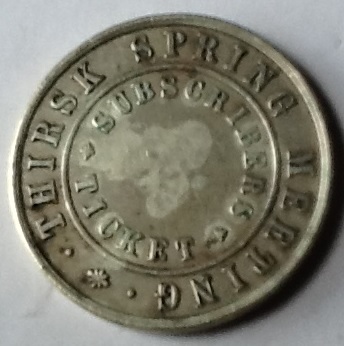
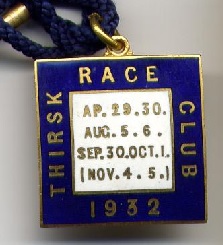
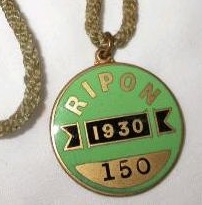
Robert Ward Armstrong, son of John William Armstrong, was born at the George Hotel in Penrith on 4th July 1863. Robert had a great love of horses from a very early age, had an ambition to become a jockey, and regularly hunted with the Eamont Hunt even before he was a teenager. He realised his ambition of becoming a National Hunt jockey, listing Opossum, Muscatel and Tomboy amongst his favourite mounts, but increasing weight curtailed his riding career. Although he was nicknamed the 'Selling Plate King' in his early training days, in 1888 he captured the Ascot Stakes with Dan Dancer.

1888 Ascot Stakes at Royal Ascot DAN DANCER 20/1 owned by J Jameson, trained by Robert Ward Armstrong and ridden by Allsopp
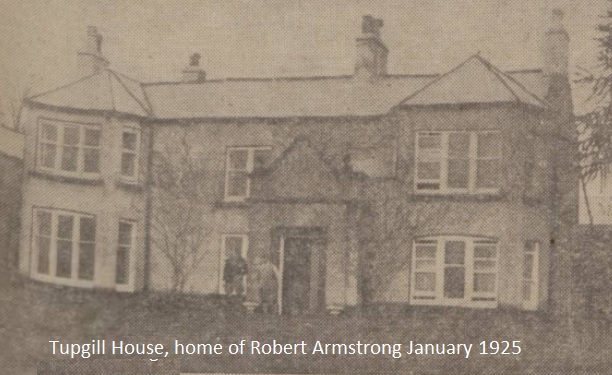
1924 Gosforth Park Handicap at Newcastle LOMCENA 2/1 owned by Sir Emanuel Hoyle, trained by Robert Ward Armstrong and ridden by J Brown
1924 Buccleugh Handicap at Edinburgh BEDA 8/1 owned by J Bell-Irving, trained by Robert Ward Armstrong and ridden by J Patman
1924 Edinburgh Gold Cup at Edinburgh ORNAMENTATION 100/30 owned by Lord Lonsdale, trained by Robert Ward Armstrong and ridden by J Beasley
1924 Autumn Handicap at Newcastle POLEMBERG owned by Lord Lonsdale and trained by Robert Ward Armstrong
1925 Edinburgh Gold Cup at Edinburgh ORNAMENTATION 5/4 fav owned by Lord Lonsdale, trained by Robert Ward Armstrong and ridden by Tommy Burns
1927 Ross Welter Handicap at Hamilton BELL ROCK 100/8 owned by W de Selincourt, trained by Robert Ward Armstrong and ridden by Gerald Armstrong
1931 Holm Hill Handicap at Carlisle SORTIE 6/1 owned by J Bell-Irving, trained by Robert Ward Armstrong and ridden by G Walsh
1936 Prince Edward Handicap at Manchester WINTER WORKER 6/1 owned by E H Bell, trained by Robert Ward Armstrong and ridden by W Christie
1924-1941 Gerald Armstrong
Gerald Armstrong, oldest son of trainer Robert Ward Armstrong, was always likely to carve out a career in horse racing and was a very promising amateur jockey. When the family moved from Clifton Hill stables, Penrith to Tupgill in 1923, father Robert trained at Tupgill, which he had owned since 1906, but had leased it to Captain N Scott, and bought Ashgill for son Fred and Thorngill for Gerald, although Gerald did not train there until later. Their sister Doris later owned Tupgill when their father died. Gerald trained under both codes in his early training career, starting with a string of 14 at Tupgill, winning the 1924 Topcliffe Handicap at Thirsk with Sir Emanuel Hoyle's IOS. He continued to train at Tupgill, with numbers fluctuating for the next decade between a low of 17 in 1927 and a high of 26 in 1929. He won the Hardwick Plate at Pontefract in 1934 with Joan of Arc 20/1, owned by Mrs P Cantrell-Hubbersty, and a year later, when his string had expanded to 39, he won the 1935 Grove Hurdle at Sedgefield with Chalo owned by Major C Whowell. Arguably, his best win came in 1936 when he maintained a string of 36, notching up a Royal Ascot success in the Jersey Stakes with Thankerton ridden by head waiter Harry Wragg. In 1940 and 1941 he was recorded, in Horses in Training, to be based at Ferngill, although this is most likely to have been his residence for some time, as Ferngill did not have any stables, so it is most likely that he continued to stable his horses at Tupgill. However, in 1942 he transferred to Thorngill where he trained just 21 horses in his first year.
1924 Topcliffe Handicap at Thirsk IOS 10/1 owned by Sir Emanuel Hoyle, trained by Gerald Armstrong and ridden by G Walsh
1934 Hardwick Plate at Pontefract JOAN OF ARC 20/1 owned by Mrs P Cantrell-Hubbersty, trained by Gerald Armstrong and ridden by R Crisp
1935 Grove Hurdle at Sedgefield CHALO 11/8 fav owned by Major C Whowell, trained by Gerald Armstrong and ridden by A Waudby
1936 Jersey Stakes at Royal Ascot THANKERTON 1/2 fav owned by Mrs J Shand, trained by Gerald Armstrong and ridden by Harry Wragg
1945-1949 Alec Boyd
Alec Boyd, son of John Boyd and brother of George Boyd, was born in 1906 and grew up in racing stables. His father, John Nimmo Boyd, trained at Peebles before taking over the stables of J McColl at Westbarns Stables in Dunbar. He trained White Bud to win the 1923 Lincoln Handicap and also ran a riding school for aspirant jockeys. Both of his sons rode, Alec as a professional and George as an amateur. In the early 1940s Alec was training at Dunbar but also had an interest in horses trained in the West End region of Middleham between 1943 and 1944. In 1945 Alec occupied stables at Tupgill, training a string of 19 in Middleham, while in 1946 this increased to 20, and he also maintained his stables in Scotland overseen by brother George. There was a dip in 1947 to 15 before rapid increases in 1948, with 28, and 1949 with 34. Alec then departed Middleham and some newspaper reports suggested that he had been warned off some time afterwards. In 1947 he won the Wokingham Handicap at Royal Ascot with Lucky Jordan 33/1 owned by Mrs G Gilroy and ridden by Jimmy Sirrett, while the next year he landed the Liverpool Autumn Cup with Desir 25/1 owned by Lord Lovat who had commanded the 1st Commando Brigade on D-Day; a just reward for his heroic leadership. At this point in his career Boyd was doing well. In October 1947, despite having just 15 horses, he was the underbidder for the Cambridgeshire entry Coup de Vent II at the Newmarket sales for 3200 guineas, while the next year he purchased Yellow Idol for 2000 guineas at the Newmarket December sales, and the horse went on to run third in the 1949 Lincoln Handicap before winning the Newcastle Spring Cup. After a highly successful 1949 season, Boyd left Tupgill.
1947 Wokingham Handicap at Royal Ascot LUCKY JORDAN 33/1 owned by Mrs G Gilroy, trained by Alec Boyd and ridden by Jimmy Sirrett
1948 Liverpool Autumn Cup DESIR 25/1 owned by Lord Lovat, trained by Alec Boyd and ridden by Cliff Richards
1949 Hurn Handicap Plate at Thirsk RIVER MOON 15/2 owned by F Foster, trained by Alec Boyd and ridden by M Pearson
1949 Newcastle Spring Cup YELLOW IDOL 5/1 owned and trained by Alec Boyd and ridden by P Maher
1949 Byland Handicap at Thirsk EASTERN VIEW 9/4 fav owned by Mr Campbell, trained by Alec Boyd and ridden by N Stirk
Melton Avril Vasey, born on 4th April 1906 in Doncaster, was the son of Fred Melton Vasey and came from a racing family steeped in history, his grandfather also trained, as did his uncle Peter. Avril was a professional jumps jockey from 1923 until 1934, partnering his first winner, Son O'Lomond, at Leicester on 19th February 1924. A remarkable incident happened in the 1929 Scottish Grand National at Bogside when he rode Donzelon, which fell at the water jump, and Avril was knocked out; he would surely have drowned had Bilbie Rees not fallen at the same water jump and rescued him. After hanging up his riding boots in 1934 he assisted his father Melton who was training at Belle Vue, Doncaster, and when his father died in early 1952 Avril took over the licence. However, in July 1952 he received a letter from F Weatherby, Secretary of the Jockey Club, instructing him, and 4 other trainers, that their licence would not be renewed in 1953 unless they vacated the stables. The Jockey Club decreed that no trainer could train from racecourse stables on a permanent basis, and that Town Moor stables would have to be vacated. During his time in Doncaster Avril, a keen golfer, was Captain of the Town Moor Golf Club for 3 seasons. Avril had to search around for new stables, and transferred his string from Woodborough House, Belle Vue to live in Ferrngill House, Middleham in October 1952 and train in stables nearby. He hit the ground running, landing his first winner from his new stables in November 1952 when British Paragon won the Consolation Plate at Manchester. In October 1953 Avril celebrated the engagement of his 3rd daughter, Patricia, to jump jockey Peter Chisman, the happy couple marrying early in 1954. Also, in 1953 Mr G Munro's Tangram notched up a sequence of 4 wins, 4 of the 26 wins Avril enjoyed that season, and ran credibly in the 1954 Lincoln Handicap partnered by stable jockey Stan Clayton. In 1954 Mr Arthur Hughes' Whitebrigg ran up a sequence of 4 consecutive handicap wins, culminating in the Great St Wilfrid Handicap at Ripon. In his 3 full seasons whilst living in Ferngill House he trained 32, 28 and 23 horses, but always thought that there was the potential to train more, so in 1956 he moved to Kingsley House Stables where he enjoyed success in some high profile races.
1952 Consolation Plate at Manchester BRITISH PARAGON 4/7 fav trained by M Avril Vasey and ridden by Willie Snaith
1953 Frying Dale Plate at Redcar FAVILLA 7/2 fav trained by M Avril Vasey and ridden by P Maher
1954 Ferngill Handicap at Catterick Bridge WHITEBRIGG 5/1 owned by Arthur Hughes, trained by M Avril Vasey and ridden by Stan Clayton
1954 Martha Lynn Handicap at Stockton WHITEBRIGG 3/1 owned by Arthur Hughes, trained by M Avril Vasey and ridden by Stan Clayton
1954 Durham County Handicap Plate at Stockton WHITEBRIGG 5/1 owned by Arthur Hughes, trained by M Avril Vasey and ridden by Stan Clayton
1954 Great St Wilfrid Handicap at Ripon WHITEBRIGG 5/2 owned by Arthur Hughes, trained by M Avril Vasey and ridden by Stan Clayton
1951-1958 Jack Weymes
John William Jack Weymes, born in 1893, father of Ernie Weymes and grandfather of John Weymes, was a successful National Hunt jockey despite embarking on his riding career later than most. He did not have his first ride in public until 5th January 1922 when partnering Safe in Bed at Bogside in a 2-mile Handicap Chase when aged 29. He was 32 before landing his first winner, Zeus, in a 2-mile Handicap Hurdle at Carlisle on 10th December 1925, but did go on to notch up 46 jumps winners, the best of which was Killadoon in the 1931 Victory Chase at Manchester. Jack was a more accomplished trainer than he was a jockey, training at Tupgill between 1951 and 1958. Between 1951 and 1953 he had a string of 13 horses which increased to 16 in 1954 when Alec Russell was appointed stable jockey. His high-profile winners were few and far between, although Nottingham was a favourite hunting ground, winning the 1953 Trent Plate with Comic Turn and the 1955 Oxclose Stakes with Nautical Touch. One of the best races he captured was the 1954 North Yorkshire Handicap at Stockton with Church Lane, owned by Lincolnshire breeder F W Dennis and ridden by Alec Russell. However, by now aged 62, and ably assisted by son Ernie, his string gradually decreased, 10 in 1956, just 6 in 1957 and 10 in 1958, and died in Northallerton on 31st May 1958, when son Ernie took over at Tupgill.
1925 Brampton Handicap Hurdle at Carlisle ZEUS 10/1 owned by A Anderson, trained by Webb and ridden by Jack Weymes
1931 Victory Chase at Manchester KILLADOON 10/1 owned by Lieutenant-Colonel Tweedie, trained by Wight and ridden by Jack Weymes
1952 Birchfield Plate at Haydock CRÈME MAURICE 7/2 owned by F W Dennis, trained by Jack Weymes and ridden by G Littlewood
1953 Trent Plate at Nottingham COMIC TURN 7/1 owned by D Flemming, trained by Jack Weymes and ridden by H Jamieson
1954 North Yorkshire Handicap at Stockton CHURCH LANE 100/6 owned by F W Dennis, trained by Jack Weymes and ridden by Alec Russell
1955 Oxclose Stakes at Nottingham NAUTICAL TOUCH 25/1 owned by F W Dennis, trained by Jack Weymes and ridden by Jimmy Etherington
1957 Beechfield Handicap at Doncaster EARNEST ALICE 4/1 fav owned by F W Dennis, trained by Jack Weymes and ridden by E Larkin
May 1958-1967 Ernie Weymes
Ernest Weymes, more commonly known as Ernie, was born in 1935 and was the son of former jockey and racehorse trainer John Jack Weymes. He assisted his father at Tupgill Stables, and when his father died on 31st May 1958 Ernie successfully applied for a trainers licence, aged just 23, to become the youngest trainer in the land, and took charge at Tupgill, starting with a string of 10. He constantly trained between 10 and 13 horses for the next 6 years, but in 1964 this had increased to 19, a year later to 23, thereafter 28, and in 1967, the year he departed Tupgill, his string stood at 22. Ester Piggott as he tried to secure the jockeys championship on the final day of the season, but he fell one short of Scobie Breasley. At the end of the 1967 season Ernie transferred his string to nearby Ashgill when his numbers increased to 37.
1963 Goodbye Consolation Plate at Manchester FURY ROAD 7/2 owned by A Turner, trained by Ernie Weymes and ridden by Lester Piggott
Joseph Henry Hartigan, born in 1919, trained at Tarporley until March 1960 before relocating to the Tupgill Estate near Middleham. He took up lodgings at Ferngill in April 1960, although there were no stables at Ferngill, so he stabled his horses at nearby Tupgill. He began with a string of 22 in 1961, which decreased to 17 the next year. By 1963 Joseph had transferred his string of 22 to Thorngill stables which were close by.
1968-1983 Jumbo Wilkinson
Benjamin Edward Wilkinson, born on 14th May 1932 in Sedgefield, was 17 when he had his first ride in public aboard Vernon Arms on Saturday 21st January 1950 at Wetherby and regularly rode for Ashgill trainer Jack Fawcus in his early career. He rode in the Grand National on 7 occasions, firstly in 1953 when unplaced on Cream of the Border for G B Mackie, beaten by Early Mist. He then gained a creditable fourth place on Glorious Twelfth for H J Joel in 1957, beaten by Sundew, and ran unplaced on the same horse the next year behind Mr What. In 1959 he was on Pintail for J P Bissill when beaten by Oxo, but his best performance was in the 1960 National behind Merryman II when Jumbo finished third on Clear Profit. He had two more unsuccessful mounts, in 1961 on Siracusa, and in 1963 on College Don. However, he did record some of his highest profile wins an Aintree, notably in the 1960 Grand Sefton on Ernest 20/1 trained by Bobby Renton, and the 1960 Becher Chase on Clear Profit 4/1 trained by R Newton. He won the 1959 Mildmay of Flete Chase at the Cheltenham Festival aboard Siracusa for Mrs E Truelove, and had previously won the 1957 Rowland Meyrick Chase at Wetherby on Symaethis Nephew. He also won the inaugural running of the Champion Novice Chase on Glorious Twelfth when it was contested at Manchester. His final winning ride was on Easter Monday, 27th March 1967 on Toledo Steel at Carlisle, and after experiencing one too many falls, he finally hung up his riding boots. In a career spanning 17 years he notched up more than 300 winners and was fully equipped for the next stage of his racing career as a trainer. He began by assisting Jack Fawcus at Ashgill, a trainer he had served his apprenticeship with between 1948 and 1953, and one he had ridden for successfully many times. However, on 30th May 1967 Jack Fawcus was tragically killed in a car crash on his journey to Uttoxeter races, and Jumbo successfully applied for a temporary trainers licence. Wilkinson was terribly upset about the death of his mentor and great friend Fawcus, but he knuckled down to the task in hand, and sent out his first winner just 2 weeks after taking out the licence. That inaugural winner was Bubbled Over, who won the Hurn Apprentice Selling Handicap at Beverley on 14th June 1967. During that 1967 season he took on the 21 Fawcus horses and, despite his success, he left Ashgill for Tupgill at the end of the season and was replaced by Ernie Weymes. Jumbo spent 16 years at Tupgill, starting in 1968 with 13 horses, but by 1973 his string had increased to 18, the largest number he ever trained. He was content to train around 14 horses annually, give or take a couple, and he always got the best out of his horses. Kelso Chant was one such horse, winning 15 races, including the prestigious Long Walk Hurdle at Ascot in 1978. Another was Armagret who won numerous races, including the Marston Moor Chase at Wetherby. In 1973, with his stable size at its maximum, he captured the Premier Long Distance Hurdle at Haydock with Be My Guest, owned by D Lennon and ridden by Brian Fletcher, in the same year Fletcher won the Aintree Grand National on Red Rum. At the end of the 1983 season Jumbo left Tupgill and transferred his string of 12 to Fell View in East Witton.
1973 Premier Long Distance Hurdle ay Haydock BE MY GUEST 5/2 owned by D Lennon, trained by Jumbo Wilkinson and ridden by Brian Fletcher
1978 Long Walk Hurdle at Ascot KELSO CHANT 10/1 trained by Jumbo Wilkinson and ridden by Steve Charlton
1969-1977 Tommy Fairhurst
Thomas Fairhurst, universally known by his nickname Squeak, was born at Horden, County Durham on 5th June 1927, moving to Middleham to serve his apprenticeship with Matt Peacock at his Manor House stables in 1942. It was a fabulous time to join the stable because the stable star, and one of the best racehorses of all time, Dante was in the stable, winning the 1945 Derby run that year at Newmarket because of the Second World War. He remained with Matt Peacock until 1946, but then National Service meant he joined the Army in Germany, a time which he probably enjoyed because he was in the Army riding school. On leaving the Army he returned to Middleham to the stables of Jack Fawcus, from where he rode the majority of his winners. He rode his first winner, Chanlana, on 20th May 1955 at Haydock, ultimately chalking up 16 Flat race winners until 1967. In 1962 he moved across the town to Ernie Weymes stable where he had a dual-purpose role, riding and acting as Head Lad. He remained with Weymes until the end of the 1968 season, and in 1969 he successfully applied for a trainer's licence, moving into The Cottage on the Tupgill Estate, and training from Tupgill Stables. He celebrated his first winner, Brython, at Pontefract on 16th April 1969 ridden by Eric Larkin, the first of 18 winners in his inaugural training season, and continued to churn out the winners whilst residing at The Cottage and Tupgill, landing the 1972 Tennent Trophy with Brython, the 1975 Firth of Clyde Stakes at Ayr with Woodsome, and guiding the juvenile Pandu to 5 successive victories at the start of the 1976 season before being put in his place by Godswalk in the Norfolk Stakes at Royal Ascot. However, in 1977 Tommy transferred to historic Glasgow House, just off the market place, and enjoyed his best season ever, notching up 34 wins, although Glasgow House originally had about 27 boxes, so Squeak had to add 10 more boxes just to stable his string, and even then he had to continue to use some of his former Tupgill boxes from time to time.
1969 Garrowby Stakes at York BRYTHON 6/1 owned by W L B Hale, trained by Tommy Fairhurst and ridden by Eric Larkin
1970 Manchester Memorial Cup Handicap at Haydock Park BRYTHON 7/1 owned by W L B Hale, trained by Tommy Fairhurst and ridden by Clive Eccleston
1970 Wills Castella Handicap at Ayr BRYTHON 7/2 owned by W L B Hale, trained by Tommy Fairhurst and ridden by Clive Eccleston
1970 Brocklesby Plate at Doncaster ROYAL LOUISE 20/1 owned by P Hornsby, trained by Squeak Fairhurst and ridden by Paul Tulk
1971 Liverpool Spring Cup at Aintree BRYTHON 8/1 owned by W L B Hale, trained by Tommy Fairhurst and ridden by Alan Horrocks
1971 Wills Castella Handicap at Ayr BRYTHON 9/4 fav owned by W L B Hale, trained by Tommy Fairhurst and ridden by Alan Horrocks
1972 Tennent Trophy at Ayr BRYTHON 11/4 owned by W L B Hale, trained by Tommy Fairhurst and ridden by Clive Eccleston
1975 Firth of Clyde Stakes at Ayr WOODSOME 11/8 fav trained by Squeak Fairhurst and ridden by Ernie Johnson
1976 Revival Maiden Stakes at Teesside Park PANDU 4/1 owned by C Barber-Lomax, trained by Squeak Fairhurst and ridden by Clive Eccleston
1976 Hillhouse 2-y-o Stakes at Ayr PANDU 8/13 fav owned by C Barber-Lomax, trained by Squeak Fairhurst and ridden by Clive Eccleston
1976 Richmond Stakes at Catterick Bridge PANDU 1/2 fav owned by C Barber-Lomax, trained by Squeak Fairhurst and ridden by Clive Eccleston
1976 Lily Agnes Stakes at Chester PANDU 5/1 owned by C Barber-Lomax, trained by Squeak Fairhurst and ridden by Stuart Webster
1976 Gallows Lane Stakes at Thirsk PANDU 4/9 fav owned by C Barber-Lomax, trained by Squeak Fairhurst and ridden by Clive Eccleston
1977 Tilcon Trophy at Redcar RELATIVE EASE 14/1 trained by Squeak Fairhurst and ridden by Clive Eccleston
1984-1988 Ralph William Stubbs
Ralph William Stubbs, better known as Bill, was born in 1945 and trained at Haxey, North Lincolnshire, but in 1984 he transferred his string to Tupgill where he trained for 5 years. In the first year his string numbered 15, but he increased it to 31 in the next year, although Tupgill had just 30 boxes at that stage. Over the next 3 years he trained 28, 25 and 22 respectively, and was described, in a nice way, by newspapers as a bargain basement trainer who got the best out of horses which others could not. In 1985 he bought Art Edict for 4600 guineas from Henry Cecil's stable and it won at Pontefract and was second at Goodwood to Rainbow Quest. In 1986 he bought Alemdar out of Michael Stoute's yard for 1700 guineas, Symbolic out of Guy Harwood's yard for 1300 guineas, and paid Henry Cecil 2700 guineas for Responder, managing wins from all three. He left Tupgill at the end of the 1988 season and was replaced by Alan Robson.
1989-1990 Alan Robson
Alan Robson, born in 1956, trained at Stockton Racecourse until 1988, but his lease came to an end, and it was made clear that it would not be renewed as the land was earmarked for redevelopment. He had always wanted to train at Middleham, and thought highly of Middleham Moor gallops, so it was with great delight that he was offered a lease at Tupgill once Bill Stubbs departed. He trained 13 horses in 1989 at Tupgill despite there being 30 boxes available to him, and continued to train just 13 in the early months of 1990, but he was aware that Mick Hammond was interested in training at Tupgill, so Robson moved on in 1990.
1988-2001 Steve Kettlewell
In 1988 Steve Kettlewell took over a yard in Tupgill stables training a string numbering 17 in his first year and, despite having 28 runners during the season, he did not achieve a winner. The next year he had 20 runners, but no winners, but he then had a string numbering 17 in 1990 and celebrated his first winner. For the next 5 years his numbers fluctuated between 16 in 1992 and 23 in 1996, and in that year he amassed 23 winners. By early 1997 he had notched up his 100th winner and stable numbers were steady at between 22 and 25. Two of his highly regarded horses were Just Bob, owned for the most part by J Fotherby, and Easby Joker owned by G R Orchard. Steve guided Just Bob to success on 19 occasions from 136 races, amassing over £61,00 in win prize money. Easby Joker managed to win 3 races in just 30 days in 1995, and it would have been 4 had he not fallen at Southwell when going well. In 2001 Steve trained just 14 horses and announced his retirement from the training ranks, choosing instead to run his own horse transport business.
1993 Castle Handicap at Musselburgh JUST BOB 5/1 owned by J Fotherby, trained by Steve Kettlewell and ridden by Jimmy Fortune
1994 Langs Supreme Scotch Whisky Handicap at Hamilton JUST BOB 9/4 fav owned by J Fotherby, trained by Steve Kettlewell and ridden by John Stack
1995 Federation Brewery Buchanan Handicap Chase at Hexham EASBY JOKER 4/1 owned by G R Orchard, trained by Steve Kettlewell and ridden by Mr C Bonner
1995 Douglas Smith Memorial Handicap Chase at Newcastle EASBY JOKER 4/6 fav owned by G R Orchard, trained by Steve Kettlewell and ridden by Peter Niven
1995 Santa Claus Handicap Chase at Hexham EASBY JOKER 11/10 fav owned by G R Orchard, trained by Steve Kettlewell and ridden by Peter Niven
1996 Swift Handicap Chase at Newcastle EASBY JOKER 4/1 owned by G R Orchard, trained by Steve Kettlewell and ridden by Peter Niven
1996 Douglas Smith Memorial Handicap Chase at Newcastle EASBY JOKER 4/1 owned by G R Orchard, trained by Steve Kettlewell and ridden by Peter Niven
1997 Scottish Communications Systems Novices Hurdle at Perth EASBY BLUE 4/1 owned by G R Orchard, trained by Steve Kettlewell and ridden by Richard Johnson
1991-15th November 1999 Micky Hammond
Michael Hammond, born on 25th September 1962 in Guildford, universally known as Micky, is the son of a bricklayer and served his apprenticeship with Tom Jones in Surrey, remaining for 4 years, and then joined Hugh O'Neill at Coldharbour. He rode his first winner in 1982 in the Magna Carta Handicap Chase at Windsor on 17th February when he partnered Excelsior 4/1. He later wrote to pools winner George Dawes to see if he would allow him to work at Kingsley House stables, joining Middleham trainer George Moore, and the pair enjoyed success in the 1986 Timeform Handicap Hurdle at Chepstow with Tingle Bell, who broke the course record by 2.3 seconds, and later the 1988 Glenlivet at Aintree and Victor Ludorum Hurdle with Royal Illiusion. Another horse who he had a great rapport with was Topham Taverns on whom he notched up 4 consecutive victories. However, arguably his most high-profile win was in the 1986 Scottish Grand National at Ayr when riding Hardy Lad 28/1 for owner Mrs Antonia Milligan and Middleham trainer Jumbo Wilkinson, defeating Aintree Grand National winner Corbiere. There were other high points, including partnering West Tip in the Cheltenham Gold Cup and Ballydurrow in the Imperial Cup. His final winner, on 30th December 1989 was aboard Colombiere 9/1 in the Fingall Selling Hurdle at Catterick, after which he decided to hang up his riding boots aged just 27, and despite riding 35 winners already that season, he applied for his own training licence. He spent part of the remainder of the jumps season assisting George Moore, but then set up as a trainer at Tupgill Park in what is now the Saddle Room Restaurant, giving him unbridled access to the Low Moor gallops. In his first season he trained 31 winners and stable numbers began to increase as soon as potential owners noticed that he was a skilful trainer. In his second season, with a string of 26, he managed 38 winners, and as the string increased to 35 in the 1992-93 season he surpassed his previous best total by recording 51 winners. In 1995 Clay County performed well in the Grade 2 Martell Aintree Chase before giving way to Coulton, although he later made amends in the 1996 Garswood Handicap Chase at Haydock. There is little doubt that Micky Hammond's greatest day of racing whilst at Tupgill was Saturday 24th February 1996 when he notched up 6 wins, triumphing in the Victor Ludorum Novices Handicap Hurdle at Haydock with Marchant Wing, then going on to win the Streeton Leisure Queen of Hearts Handicap Hurdle at Haydock before landing the final 4 races on the Musselburgh card. What is remarkable about the 6 wins was that it was for 6 different owners, ridden by 6 different jockeys, the last 4 at Musselburgh were at combined odds of 802/1, while an accumulator on all six would have paid 64,259/1. By 1997 it is no surprise that his string had grown to 74 and the very next year he landed one of his highest profile victories in the Glenlivet Anniversary Hurdle at Aintree, a race in which he rode the winner exactly a decade before. In 1998 Deep Water won the Grade 1 Glenlivet Anniversary Hurdle at Aintree at 8/1 for the County Set. As early as 1997 Micky was planning a move from Tupgill having purchased Oakwood Stables, on the outskirts of Middleham, where Ferdy Murphy had been based. The stables needed work and extending, so Micky remained at Tupgill, with horses in training continuing to list Micky at Tupgill until the end of 1999. However, eventually Micky transferred his string to his new stables at Oakwood.
1982 Magna Carta Handicap Chase at Windsor EXCELSIOR 4/1 trained by Hugh O'Neill and ridden by Micky Hammond
1986 Scottish Grand National at Ayr HARDY LAD 28/1 owned by Mrs Antonia Milligan, trained by Jumbo Wilkinson and ridden by Micky Hammond
1986 Timeform Hurdle at Chepstow TINGLE BELL 10/1 trained by George Moore and ridden by Micky Hammond
1988 Glenlivet Anniversary Hurdle at Aintree ROYAL ILLUSION 9/1 trained by George Moore and ridden by Micky Hammond
1988 Victor Ludorum Hurdle at Haydock ROYAL ILLUSION 20/1 trained by George Moore and ridden by Micky Hammond
1989 Fingall Selling Hurdle at Catterick COLOMBIERE 9/1 trained by George Moore and ridden by Micky Hammond
1995 Martell Aintree Chase CLAY COUNTY 9/1 owned by M G St Quinton, trained by Micky Hammond and ridden by Norman Williamson second behind Coulton
1995 Little Bay Handicap Chase at Perth CLAY COUNTY 10/11 fav owned by M G St Quinton, trained by Micky Hammond and ridden by Brian Storey
1996 Garswood Handicap Chase at Haydock CLAY COUNTY 5/4 owned by M G St Quinton, trained by Micky Hammond and ridden by Adrian Maguire
1998 Glenlivet Anniversary Hurdle Grade 1 at Aintree DEEP WATER 8/1 owned by The County Set, trained by Micky Hammond and ridden by Russ Garrity
Micky Hammond's Big Day, a 6-timer on Saturday 24th February 1996
Haydock Victor Ludorum Novices Handicap Hurdle MARCHANT WING 7/1 owned by Roland Roper, trained by Micky Hammond and ridden by Russ Garrity
Stretton Leisure Queen of Hearts Handicap Hurdle at Haydock OUTSET 9/1 owned by Mark Kilner, trained by Mickey Hammond and ridden by Charlie Hall
Scottish Racing Club Handicap Chase at Musselburgh WISE ADVICE 7/2 owned by A G Chappell, trained by Micky Hammond and ridden by Andrew Thornton
Edinburgh University Handicap Hurdle at Musselburgh MASTER OF THE HORSE 16/1 owned by Master of the Horse, trained by Micky Hammond and ridden by Brian Storey
Edinburgh University Turf Club Novices Handicap Hurdle at Musselburgh ELPIDOS 2/1 fav owned by Mrs Margi Winter, trained by Micky Hammond and ridden by M Foster
Port Seton Maiden Hurdle at Musselburgh ROYAL CRIMSON 5/2 owned by Mrs W A Beaumont, trained by Micky Hammond and ridden by O Pears
6 different horses for 6 different owners ridden by 6 different jockeys
The final 4 races on the Musselburgh card were an 802/1 accumulator
All 6 winners were a 64,259/1 accumulator
2001-2005 James Bethell (Tupgill)
James David William Bethell, son of David, 5th Baron Westbury, was born on 22nd February 1952 and was always likely to forge a career in racing given that his father was a prominent Member of the Jockey Club. After completing his compulsory education, James gained experience of training, initially with Bruce Hobbs in Newmarket, and then Arthur Budgett at a time when Budgett won the Epsom Derby with Morston in 1973, having already won it in 1969 with Blakeney before Bethell had joined him. In 1975, at the tender age of 23, James took over from Arthur Budgett and very soon celebrated his first winner, Baffin Bay at Bath on 28th April 1975. In 1992 James transferred his string to Middleham to take over at Manor House stables, and knew that he had a high standard to maintain. In his first season at his new premises he had a string of 19, but the next year it increased to 28 and the year after to 29. At some stage the premises became known as Sunsque Cottage and the famous yard was labelled the Dante Yard. In 1996 Bethell became linked with Clarendon House, a grade II Listed building on the south side of the market place in Middleham when his string decreased to 20. However, in 1997 Sally and James Bethell launched Clarendon Thoroughbred Racing from their Manor House Stables, a group which went on to enjoy tremendous success. James won the Group 2 July Stakes in 1996 with Rich Ground, and in 1998 won the early season Lincoln Handicap at Doncaster with Hunters of Brora owned by Robert Gibbons. At the end of 2000 James transferred to Tupgill Park, taking over stables previously occupied by Micky Hammond who had relocated to Oakwood Stables, on the outskirts of town. Manor House stables were purchased by Patrick Haslam who moved just across the road from his Castle Stables.
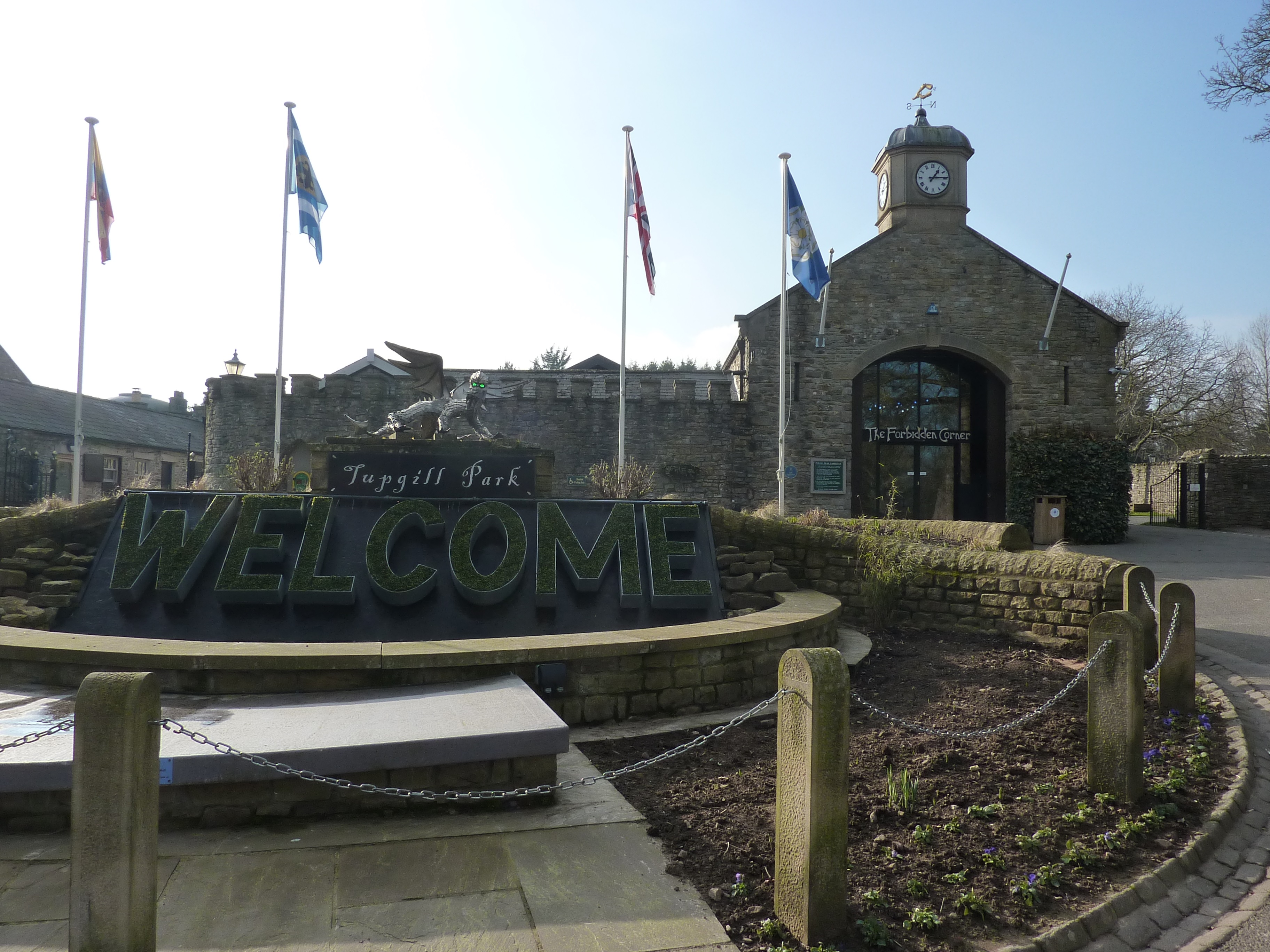
2002 Bunbury Cup at Newmarket MINE 5/1 fav owned by M J Dawson, trained by James Bethell and ridden by Kieren Fallon
2004 Royal Hunt Cup at Royal Ascot MINE 16/1 owned by M J Dawson, trained by James Bethell and ridden by Richard Quinn
2004 Victoria Cup at Ascot MINE 5/1 fav owned by M J Dawson, trained by James Bethell and ridden by Richard Quinn
2005 Bunbury Cup at Newmarket MINE 16/1 owned by M J Dawson, trained by James Bethell and ridden by Richard Quinn
2005 Gillies Fillies Stakes at Doncaster STRAWBERRY DALE 33/1 owned by M J Dawson, trained by James Bethell and ridden by Jamie Spencer
DOCTOR SYTAX (7 consecutive Preston Gold Cups, 5 Lancaster Goild Cups, 5 Richmond Gold Cups)
REVELLER (1818 St Leger, Doncaster Stakes, Lancaster Gold Cup, Preston Gold Cup)
PRETENDER (1869 Epsom Derby, 2000 Guineas)
ST PATRICK (1820 St Leger)
PAN (1808 Epsom Derby)
